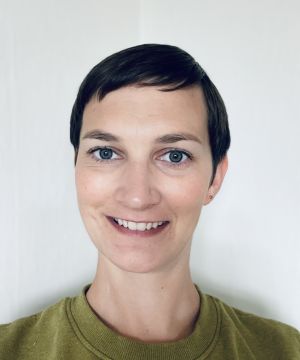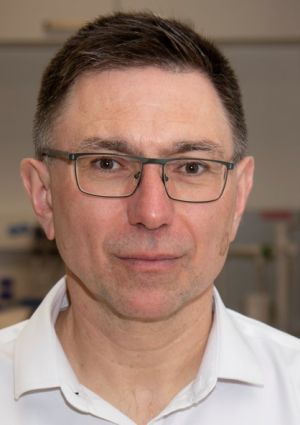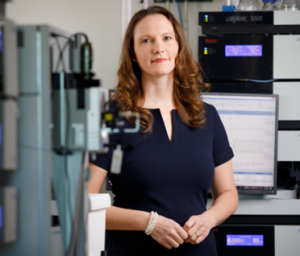GlyGen Webinar Series
The GlyGen project organizes public webinars on diverse topics, ranging from bioinformatics databases to new glycomics analysis techniques producing interesting data. Recordings of the talks are released on the GlyGen YouTube channel.
October 31, 2023 - Stacia R. Engel

The Awesome Power of SGD
Stacia R. Engel, PhD
Department of Medicine
Stanford University
The Saccharomyces Genome Database (SGD, https://www.yeastgenome.org) is the community resource for the most widely used scientific model organism, the budding yeast Saccharomyces cerevisiae. The SGD project provides encyclopedic information about the yeast genome and its genes, proteins, and other encoded features, including the reference genome sequence and official S. cerevisiae genetic nomenclature, all gathered and maintained through high-quality manual curation of experimental results as reported in peer-reviewed scientific literature. This complex collection of information is integrated with a variety of bioinformatic tools, a powerful query engine, a vast data warehouse, and a rich genome browser, then presented to users via a series of locus summary pages, in order to facilitate experimental design and analysis, allowing productive discovery of new biological details.
Webex Meeting Details
Date: Tuesday October 31, 10am ET
Meeting link: https://gwu.webex.com/gwu/j.php?MTID=m7f290a1348e2f07a418933d198d64b45
Meeting number: 2621 583 1125
Password: GlyGenTalks
Recorded Talk Video:
Link: https://www.linkedin.com/in/staciaengel/
September 26, 2023 - Marissa Maciej-Hulme

Pushing new frontiers in GAGomics
Marissa Maciej-Hulme, PhD
Department of Pharmacy
Oslo Metropolitan University Centre
Oslo, Norway
Glycosaminoglycans (GAGs) are long linear mammalian polysaccharides synthesized on select protein cores that play a plethora of roles in development, homeostasis, and disease. GAGomics seeks to profile GAGs using mass spectrometry and bioinformatics for the identification of significant structures as diagnostics and treatment targets. Dr. Marissa Maciej-Hulme will explore the current status of GAGomics as well as future directions of the field.
Webex Meeting Details
Date: Tuesday September 26, 10am ET
Meeting link: https://gwu.webex.com/gwu/j.php?MTID=m7f290a1348e2f07a418933d198d64b45
Meeting number: 2621 583 1125
Password: GlyGenTalks
Recorded Talk Video:
Link: https://www.linkedin.com/in/marissa-maciej-hulme-38b5b651/?originalSubdomain=nl
August 22, 2023 - Manfred Wuhrer

Mass spectrometry glycomics of tissues and biofluids
Manfred Wuhrer, PhD
Center for Proteomics and Metabolomics
Leiden University Medical Centre
Leiden, Netherlands
Glycans play key roles in the etiology of many diseases. They shape cell-cell interactions and are entry points for pathogens. Mass spectrometry is emerging as the key technology assessing glycans in human specimens such as blood, saliva and biopsies. My laboratory develops mass spectrometry workflows which we apply for assessing the glycomic dimension of human diseases, with the aim of obtaining therapeutic and diagnostic leads for improving health.
Webex Meeting Details
Date: Tuesday August 22, 10am ET
Meeting link: https://gwu.webex.com/gwu/j.php?MTID=m7f290a1348e2f07a418933d198d64b45
Meeting number: 2621 583 1125
Password: GlyGenTalks
Recorded Talk Video: https://www.youtube.com/watch?v=F-B6kltstKM
Link: Manfred Wuhrer (University Leiden)
April 18, 2023 - Harry Brumer

CAZypedia – A Living Encyclopedia of Carbohydrate-Active Enzymes
Harry Brumer, PhD
Department of Chemistry
The University of British Columbia
Vancouver, BC, Canada
CAZypedia was initiated in 2007 to create a comprehensive, living encyclopedia of the carbohydrate-active enzymes (CAZymes) and associated carbohydrate-binding modules. CAZypedia is closely connected with the actively curated CAZy database, which provides a sequence-based foundation for the biochemical, mechanistic, and structural characterization of these diverse proteins. Now comprising over 200 individual Curator Approved family pages, , CAZypedia is a successful example of dynamic, community-driven, and expert-based biocuration.
Link: CAZypedia
March 28, 2023 - Rebekah L. Gundry

Expanding our View of the Cardiac Surfaceome: New Bioinformatic Tools and Technologies for Mapping Glycoproteins and Glycans from Small Sample Sizes
Rebekah L. Gundry, PhD
Department of Cellular & Integrative Physiology, College of Medicine
University of Nebraska Medical Center
Omaha, NE, USA
Cell surface glycoproteins and glycans play critical roles in a range of biological functions and disease processes. However, the lack of facile methods for sample preparation and data analysis has historically posed major challenges to their characterization. This presentation will describe the new CellSurfer and glyPAQ platforms for robust and rapid mass spectrometry-based analysis of cell surface glycoproteins and glycans and their applications to the human heart.
Link: Lab webpage
February 07, 2023 - Christopher M. West

A brief excursion through the glycobiology of unicellular eukaryotes
Christopher M. West, PhD
Complex Carbohydrate Research Center
University of Georgia
Athens, GA, USA
Unicellular eukaryotes have evolved diverse adaptations to many earthly environments, including as pathogens of human and plant hosts. Their glycosylation is often similarly varied, and the extant record reflects a combination of evolutionary history and contributions to fitness that are only beginning to be explored in detail. I will introduce select aspects of the glycomics, glycogenomics and glycobiology of the soil-borne amoebozoan Dictyostelium discoideum, the apicomplexan human pathogen Toxoplasma gondii, and the agent for Chagas disease Trypanosoma cruzi.
Link: Lab webpage
December 06, 2022 - Lingjun Li

Advancing Glycomics and Glycoproteomics via MultiplexedChemical Tagging Technology
Lingjun Li, PhD
School of Pharmacy and Department of Chemistry
University of Wisconsin-Madison
Madison, WI, USA
Glycosylation is one of the most important and most complex protein post-translational modifications. Alterations in glycomic profiles have been linked to various diseases, including cancer, neurodegenerative disorders, and cardiovascular problems. Thus, new methods are needed for quantitative analysis of glycans to facilitate the elucidation of their diverse functional roles in human diseases.Advances in mass spectrometry (MS)-based glycoproteomics and glycomics are increasingly enabling qualitative and quantitative approaches for site-specific structural analysis of protein glycosylation. In this presentation, Iwill describe our recent efforts in developing both MS1 and MS2-based relative quantification strategies for glycomic and glycoproteomicanalysis ofbiological samples. Several cost-effective and novel isobariclabeling reagents will be highlighted for their utility in quantitativeglycanand glycopeptideanalyses ofhuman serum and cerebrospinal fluid samples.
Recording of the Talk: YouTube
Link: Lab webpage